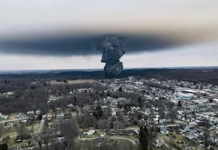
Just days before the world marked the one-year anniversary of Russia’s invasion of Ukraine, Vladimir Putin announced that Russia is suspending its participation in the New START nuclear arms treaty with the U.S., the last remaining agreement that regulates the world’s two largest nuclear arsenals. Russia’s Foreign Ministry later stated that the decision to suspend participation in the treaty was “reversible.”
New START places limits on the number of intercontinental-range nuclear weapons that both the U.S. and Russia can deploy. As the current treaty expires in 2026, both countries will soon need to begin negotiations on a new, successor nuclear arms control agreement.
In 2002, President George W. Bush unilaterally withdrew from the Anti-Ballistic Missile Treaty. The Trump regime then abandoned the Intermediate Range Nuclear Forces Treaty in 2018 and the Open Skies treaty in 2020. The withdrawal from, or expiration of most nuclear agreements between the U.S. and Russia has become more dangerous in the midst of Russia’s war in Ukraine, where the U.S. and NATO countries are actively supplying weapons and intelligence to Ukraine’s military. Between The Lines’ Scott Harris spoke with Jon Rainwater, executive director of Peace Action, who assesses the danger inherent in Vladimir Putin’s recent decision to suspend Russia’s participation in the New START nuclear arms treaty.
JON RAINWATER: This is the last major treaty going by the wayside. And so, it’s ominous in the sense that we’re losing the weak arms control regime that we’ve had dealing with the threat of nuclear weapons.
I think there’s multiple sets of problems here. One is the more technical, and that goes to less consultation between the U.S. and Russia on these nuclear weapons. Less transparency in terms of data exchanges between the countries and less inspections.
And just at the beginning, that lack of transparency is a huge problem in terms of just ratcheting up the likelihood of a — God forbid — error when it comes to the two countries because they don’t know what exactly is going on.
The second set of problems, specifically with New START, the New START doesn’t just have transparency measures; it has ceilings on warheads and weapons and bombs and delivery systems and the countries, either one or both of the countries could blow past those ceilings.
Now, that’s less likely. That’s harder for the countries to do. It’s less of an immediate threat, but it certainly could happen over time.
But what we wanted is implementation of New START and actually greater negotiations between Russia and the United States, the two biggest nuclear countries. And this just makes that harder and less likely.
So it’s very ominous. I think that’s the right word.
SCOTT HARRIS: John, a lot of commentators analyzing what Putin said about suspending participation in the New START treaty noted that he used the phrase suspension of Russia’s participation rather than withdrawal. How significant is that, do you think?
JON RAINWATER: I think it’s very significant because the first step should be to resuscitate the treaty or as much as possible of that. So overall, I think what the grassroots can do is press the United States to engage in nuclear diplomacy with Russia. And what we need to do is to get New START back on track, ideally as much or all of that as possible or all of that.
But we need to go beyond that and have the U.S. and Russia engaging in a longer-term arms control “dance” or diplomacy. New START was set to expire in 2026 anyway, so there needed to be diplomacy now to do follow on agreements. But certainly, we in the United States should be pressing the U.S. not to do anything in reaction to Putin’s withdrawal.
And certainly, the Republicans and other allies who want to ramp up nuclear weapons production, the United States would like to do that. And then we have to press the Biden administration to engage in robust diplomacy with Russia. We should not just take this on face value and the suspension does allow us to go back to the table immediately — or as soon as we can, at least — and try to get things rolling again.
SCOTT HARRIS: There was a recent poll that talked about 58 percent of Americans are fearful of a nuclear war beginning over this conflict in Ukraine. What can citizens do to pressure our legislators and the current Biden administration to take seriously the threat of nuclear war and address it on pursuing some of the policy prescriptions that your group is advocating? I know a longstanding objective is to have the United States adopt a no-first use policy regarding your weapons.
But maybe just quickly summarize, if you would, what would be the top two, three or four items that you would suggest activists and people just frightened of the specter of a nuclear war — what should they be pursuing in terms of pressuring their legislators?
JON RAINWATER: Well, one thing this bill, by Jim McGovern, as part of the Back from the Brink effort that lay out several things that the United States can do. One is to support the Treaty on the prohibition of nuclear weapons. One is no first use.
Something else that’s critical is we are spending as much or more as what we did during the Cold War on nuclear weapons. So that’s starving money from social needs that that are incredibly urgent, as well as helping to create a nuclear arms race. So that’s incredibly important to oppose. So those are some of the top issues. I would encourage, you know, people to get involved in efforts like Defuse Nuclear, get involved in Peace Action. Sign up for email alerts.
I mean, people associate that with slacktivism, but signing up for email alerts is a great way to track where you can plug in and pressure your members of Congress on these issues. So that would be something pragmatic that people could do to keep in the loop on what these various efforts are.
Listen to Scott Harris’ in-depth interview with Jon Rainwater (26:50) and see more articles and opinion pieces in the Related Links section of this page.
For the best listening experience and to never miss an episode, subscribe to Between The Lines on your favorite podcast app or platform: Apple Podcasts, Spotify, Stitcher, Google Podcasts, Amazon Music, Tunein + Alexa, Castbox, Overcast, Podfriend, iHeartRadio, Castro, Pocket Casts, RSS Feed.




